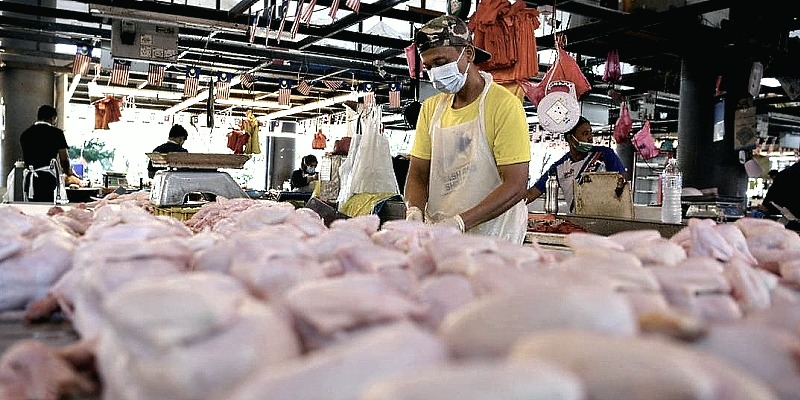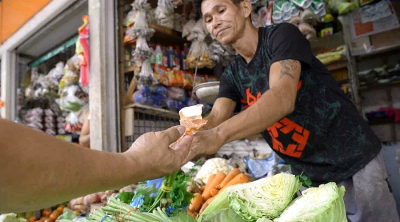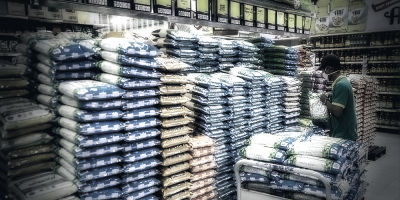While setting a new ceiling price for chicken, it is imperative for the government to not only take into account the financial burden of the people, but also the poultry farmers’ cost dilemma.
Last Tuesday, domestic trade and consumer affairs minister Alexander Nanta Linggi announced that the government would end the ceiling prices for chicken, eggs and 2/3/5 kg palm cooking oil with effect from July 1.
Many are worried the decision would instantly send the prices of these food items soaring, triggering chain effects that will further add to the financial burden of Malaysians.
As the month of June is coming to a close, many are prepared to tighten their belts in anticipation of massive price hikes come the new month.
But fortunately, the government suddenly makes a mini U-turn, and has decided to continue setting ceiling prices for chicken.
In the meantime, the government has also resolved not to increase the electricity and water tariffs in Peninsular Malaysia, which to many Malaysians struggling under the weight of skyrocketing prices is a welcome relief.
Although our inflation rate has not gone up too much based on the official figures, many have deeply felt the humongous pressure from soaring goods prices in day-to-day living. They will come under additional blow if the prices of chicken, eggs and others rise again.
Looking at how prices have increased in more recent years could be terrifying. From around RM30 for a 5 kg pack of blended cooking oil, the price has now surged to about RM45, while the price of pork has jumped a whopping 63% from RM760/100 kg earlier this year to RM1,240 today, not to mention higher prices for almost everything else!
The government’s decision to continue setting a new ceiling price for chicken is believed to help stem runaway inflation and give the rakyat the much needed respite from suffocating price hikes.

That said, while setting a new ceiling price for chicken, it is imperative for the government to not only take into account the financial burden of the people, but also the poultry farmers’ cost dilemma.
A new ceiling price which is too high will invariably burden the rakyat and exacerbate the inflationary pressure. But if the ceiling price is set too low, who would want to do a loss-making business? What will happen next is short supply of chicken in the market, driving prices even higher.
Prices of animal feed rise beyond the control of poultry farmers, who will incur losses if the cost goes up too much, and this will most positively squeeze the supply of chicken in the market.
In short, while consumers are plunged into a dilemma of having to struggle to make ends meet, the chicken farmers are also experiencing sky-high production costs.
The government should hold a heart-to-heart talk with the farmers in fixing a more acceptable ceiling price to avert a possible supply crunch.
Consumers, meanwhile, must never think that the lower the ceiling price, the better it is for them, because if the cost overrun eventually takes its toll on market supply, chicken may not be readily available in the market!
It is learned that the new ceiling price for chicken is expected to be below RM10 per kg so that consumers will not be overly affected.
Additionally, while the ceiling price mechanism to a certain extent helps tame inflation, other factors that will drive prices higher continue to exist, such as the removal of government subsidy and ceiling price for bottled palm cooking oil. If the additional cost is not absorbed by food operators, it will eventually be transferred to the consumers.
Given the continuous bouts of price hikes of late, Malaysians, in particular the B40 households, have been struggling to stay afloat.
Although the government has just announced additional RM100 allowance for B40 households (RM50 for singles), the amount is of negligible help to bolster the heavy financial impact on them.
The dual challenges from the Covid-19 pandemic and a debilitating war in Europe have severely disrupted supply chains and there is no end in sight to the prevailing inflation now sweeping across our world!
In view of this, the government must make early preparations and study all workable solutions that will help relieve the financial burden of the rakyat simply because handing out allowances and setting ceiling prices will not offset the inflationary pressure in the long run.
ADVERTISEMENT
ADVERTISEMENT








































